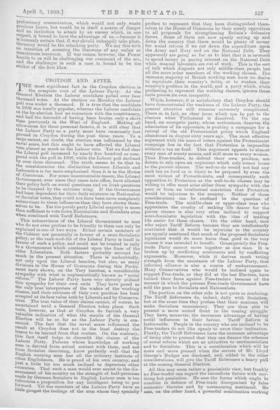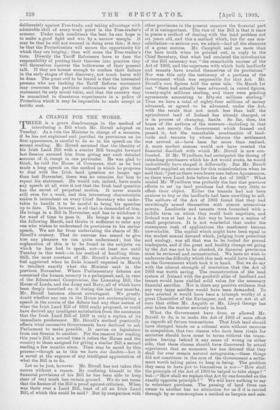CROYDON AND AFTER.
THE most significant fact in the Croydon election is the complete rout of the Labour Party. At the General Election the Labour candidate polled over four thousand votes. At the election on Monday the Labour poll was under a thousand. It is true that the candidate In 1906 was locally popular, whereas the Labour candidate at the by-election had no connexion with the constituency, and had the discredit of having been beaten only a short time previously in the West of England. Making all allowances for these personal factors, it is still clear that the Labour Party as a party must have immensely lost ground in Croydon during the past three years. To a large extent, no doubt, the election was influenced by the naval scam, but this ought to have affected the Liberal vote almost as much as the Labour vote. Yet we find that the Liberal poll increased by nearly five hundred as com- pared with the poll in 1906, while the Labour poll declined by over three thousand. The truth seems to be that in the constituencies the distinction between Liberals and Labourites is far more emphasised than it is in the House of Commons. For some unaccountable reason, the Liberal Government, ever since they came into office, have allowed their policy both on social questions and on Irish questions to be dictated by the extreme wing. If the Government had been dependent for their daily existence on Nationalist or Socialist votes, they could not have been more completely subservient to these influences than they have shown them- selves to be. Yet the purely party Liberal majority is more than sufficient to vote down Nationalists and Socialists even When combined with Tariff Reformers.
This subservience of the Liberal Government to men who do not even profess to be friendly to them can only be explained in one of two ways. Either certain members of the Cabinet are personally in favour of a semi-Socialistic policy, or the rank-and-file of the Liberal Party is itself in tavour of such a policy, and could not be trusted to rally to a Government which continued upon the lines of the older Liberalism. Both factors probably account for Much in the present situation. There is undoubtedly, not only upon the Liberal benches, but also, as many divisions in the House of Commons during this Parlia- ment have shown, on the Tory benches, a considerable Sympathy with what is euphemistically known as "social reform." The Labour Party have very cleverly utilised this sympathy for their own ends. They have posed as the only true interpreters of the wishes of the working Classes, and their estimate of their own position has been accepted at its face value both by Liberals and by Conserva- tives. The true value of their claims cannot, of course, be ascertained until a General Election takes place. Such tests, however, as that at Croydon do furnish a very valuable indication of what the results of the General Election will be so far as the Labour Party is con- cerned. The fact that the naval scare influenced the result at Croydon does not in the least destroy the lesson to be learned from that contest, On the contrary, this fact itself helps to discredit the claims of the Labour Party. Persons whose knowledge of working men is derived from actual contact with them, and not from Socialist theorising, know perfectly well that the English working man has all the ordinary instincts of Other Englishmen. He is proud of his own country, and just a little bit too much inclined to depreciate other countries. That such a man would ever assent to the dis- armament of his country on the strength of half-promises Made by German Socialists to English Labour men is too ridiculous a proposition for any intelligent being to put forward. Yet the members of the Labour Party have so little gauged the feelings of the men whom they specially profess to represent that they have distinguished them- selves in the House of Commons by their steady opposition to all proposals for strengthening Britain's defensive forces. Some of them are now openly saying up and down the conntry that there would be plenty of money for social reform if we out down the expenditure upon the Army and Navy and on the National Debt. They apparently are going so far as to hint that it is immoral to spend money in paying interest on the National Debt while manual labourers are out of work. This is the sort of talk which disgusts not only middle-class people, but all the more sober members of the working classes. The immense majority of British working men have no desire to repudiate their country's debts, or to weaken their country's position in the world, and a party which, while professing to represent the working classes, ignores these facts proves its own incapacity.
While, however, it is satisfactory that Croydon should have demonstrated the weakness of the Labour, Party, the general situation still remains extremely complicated. There is, in fact, no clear issue which can be put to the electors when Parliament is dissolved. On the one hand, an energetic party, whose enthusiasm deserves the admiration of its opponents, is pushing a campaign for a revival of the old Protectionist policy which England abandoned in disgust sixty years ago. The most effective argument with the mass of voters against the Protectionist campaign lies in the fact that Protection is impossible without a tax on food. This argument appeals to almost every man of scanty means, and still more to every woman. Thus Free-traders, to defend their own position, are driven to rely upon an argument which only comes home to the poorest classes. The well-to-do would not feel any such tax on food as is likely to be proposed by even the most violent of Protectionists, and consequently such opposition to Protection as the well-to-do classes may be willing to offer must arise either from sympathy with the , poor or from an intellectual conviction that Protection would be injurious to the country. Neither of these considerations can be confined to the question of ' Free-trade. The middle-class or upper-class man who appreciates the cruelty of making life dearer for the poorer classes is also very often inclined to support semi-Socialistic legislation with the idea of making life easier for these classes. On the other hand, men who reject Tariff Reform because they are intellectually convinced that it would be injurious to the country are equally convinced that much of the proposed Socialistic legislation would do more harm than good to the very classes it was intended to benefit. Consequently the Free- trade Party cannot move together as one Man. It is broken up by conflicting sentiments and by conflicting arguments. Moreover, while it derives much voting strength from the assistance of the Labour Party, that informal alliance is also a source of embarrassment. Many Conservatives who would be inclined again to support Free-trade, as they did at the last Election, have turned their faces against Free-traders because of the manner in which the present Free-trade Government have sold the pass to Socialists and Nationalists.
The position on the other side is not quite so confusing. The Tariff Reformers do, indeed, daily with Socialism, but at the same time they profess that their nostrum will make Socialism unnecessary. They are thus able to present a more united front in the coming struggle. They have, moreover, the enormous advantage of having social influences in their favour. Tariff Reform is fashionable. People in the country who are inclined to be Free-traders do not like openly to avow their inclination. Finally, the Tariff Reformers have the immense advantage of being able to pretend that they can finance the schemes of social reform which are so attractive to sentimentalists and to Socialists. This is a consideration which will be more and more pressed when the secrets of Mr. Lloyd George's Budget are disclosed, and, added to the other considerations, will give the Tariff Reformers a heavy pull at the coming General Election. All this may seem rather a pessimistic view, but frankly no Free-trader can regard the immediate future with any- thing but pessimism. He sees the forces which ought to combine in defence of Free.trade disorganised by false economic theories and by unreasoning sentiment. He sees, on the other hand, a 'powerful combination working deliberately against Free-trade, and taking advantage with admirable skill of every weak point in the Free-trader's armour. Under such conditions the best he can hope is to make a good fight and win by a narrow margin. It May be that he will not succeed in doing even this ; it may be that the Protectionists will secure the opportunity for Which they are longing ; then will come the Free-trader's turn, Directly the Tariff Reformers have to face the responsibility of putting their theories into practice they will themselves discover the hollowness of their present talk. If they are honest enough to confess their failure in the early stages of that discovery, not much harm will be done. The great evil to be feared is that the interested persons who are backing the Tariff Reform movement may overcome the patriotic enthusiasts who give that movement its only moral value, and that the country may be committed to disastrous experiments in a policy of Protection which it may be impossible to undo except at terrific cost.











































 Previous page
Previous page